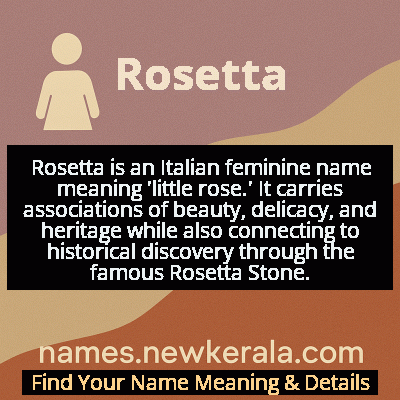Rosetta Name Meaning & Details
Origin, Popularity, Numerology Analysis & Name Meaning of Rosetta
Discover the origin, meaning, and cultural significance of the name ROSETTA. Delve into its historical roots and explore the lasting impact it has had on communities and traditions.
Name
Rosetta
Gender
Female
Origin
Italian
Lucky Number
8
Meaning of the Name - Rosetta
Rosetta is an Italian feminine name meaning 'little rose.' It carries associations of beauty, delicacy, and heritage while also connecting to historical discovery through the famous Rosetta Stone.
Rosetta - Complete Numerology Analysis
Your Numerology Number
Based on Pythagorean Numerology System
Ruling Planet
Saturn
Positive Nature
Ambitious, efficient, realistic, and authoritative.
Negative Traits
Materialistic, stressed, confrontational, and can be overly ambitious.
Lucky Colours
Dark blue, black.
Lucky Days
Saturday.
Lucky Stones
Blue sapphire, amethyst.
Harmony Numbers
2, 4, 6.
Best Suited Professions
Business leaders, managers, financial services, law enforcement.
What People Like About You
Leadership, determination, organizational skills.
Famous People Named Rosetta
Rosetta Stone
Archaeological artifact
Key to deciphering Egyptian hieroglyphs
Rosetta Tharpe
Musician
Pioneering gospel and rock 'n' roll artist
Rosetta LeNoire
Actress and producer
Tony-nominated performer and theatre founder
Rosetta Loy
Author
Award-winning Italian novelist
Name Variations & International Equivalents
Click on blue names to explore their detailed meanings. Gray names with will be available soon.
Cultural & Historical Significance
The name also appears in Christian contexts, often associated with the Virgin Mary through titles like 'Mystical Rose,' adding spiritual dimensions to its meaning. Throughout the 19th and 20th centuries, Rosetta maintained popularity among Italian and Italian-American families as both a given name and a term of endearment, preserving cultural identity while adapting to new environments. In modern times, the name has been adopted by scientific missions (ESA's Rosetta spacecraft) and language-learning software, further expanding its cultural footprint while maintaining its core associations with discovery and beauty.
Extended Personality Analysis
Individuals named Rosetta are often perceived as possessing a blend of delicate strength and intellectual curiosity, much like the flower and artifact that share their name. They typically exhibit a graceful, nurturing presence combined with a sharp, analytical mind—able to appreciate beauty while seeking deeper understanding. Rosettas are frequently described as having an old-world charm and elegance, yet they adapt well to modern contexts, showing resilience and versatility in various situations.
Their personality often balances artistic sensitivity with practical intelligence, making them both creative problem-solvers and compassionate companions. Many Rosettas demonstrate a natural curiosity about history, languages, and cultural traditions, reflecting the name's connection to the famous stone that unlocked ancient mysteries. They tend to be detail-oriented yet see the bigger picture, possessing the patience to unravel complex situations while maintaining their inherent warmth and approachability. This combination of traits often makes them excellent mediators, educators, or artists who can bridge different perspectives.
Modern Usage & Popularity
In contemporary times, Rosetta maintains a distinctive yet accessible presence in naming trends. While never reaching the peak popularity of its root name Rosa or similar floral names, it enjoys steady usage particularly among families with Italian heritage or those seeking vintage revival names. The name saw increased attention following the successful Rosetta space mission (2004-2016), which brought the name back into public consciousness with modern, scientific associations. Currently, Rosetta ranks outside the top 1000 names in the United States but maintains stronger popularity in Italy and among Italian diaspora communities. It appeals to parents looking for names that are both traditional and uncommon, offering classic elegance without being overly trendy. The name's connection to language learning (through Rosetta Stone software) and scientific discovery gives it contemporary relevance while preserving its historical charm, making it an attractive choice for families valuing both heritage and innovation.
Symbolic & Spiritual Meanings
Symbolically, Rosetta represents the intersection of beauty and knowledge, combining the delicate symbolism of the rose with the intellectual weight of the Rosetta Stone. The rose element conveys traditional meanings of love, beauty, secrecy (sub rosa), and the balance between pleasure and pain through its thorns. Meanwhile, the artifact connection adds layers of meaning related to translation, discovery, and the unlocking of hidden knowledge. Together, these elements create a rich symbolic tapestry where natural beauty meets intellectual pursuit, where delicate appearance conceals inner strength, and where tradition serves as a key to understanding the present. The name suggests someone who can appreciate aesthetic beauty while seeking deeper truths, who values both heritage and progress, and who serves as a bridge between different worlds or perspectives—much like the original stone that connected ancient Egyptian culture to modern understanding.

